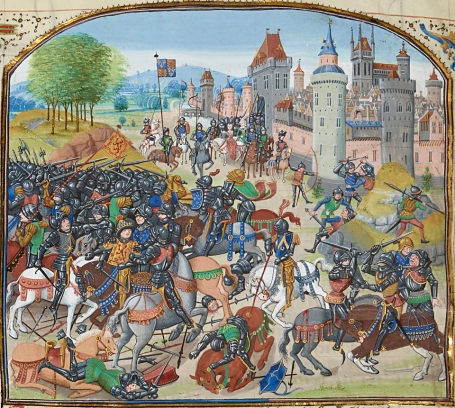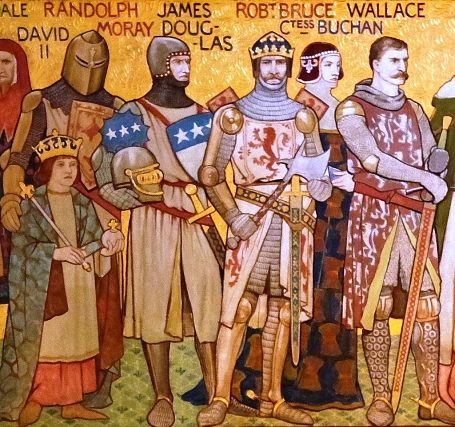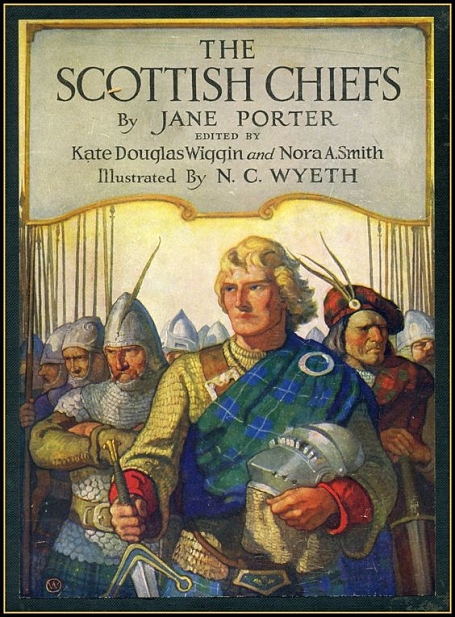The Life and Heroick Actions of the Renoun'd Sir William Wallace,
General and Governour of Scotland
by William Hamilton of Gilbertfield
Book VII, Chapter III
How WALLACE won ST. JOHNSTOUN
When Wallace quite had clear'd the Highland Coast,
Kill'd the McFadzean, and defeat his Host:
And wisely setled all Argyll, and Lorn,
In spite of all that Rogues Contempt and Scorn,
Nothing he long'd so much to see on Earth,
As sweet St. Johnstoun, now the Town of Perth.
Ramsay he calls, both trusty, true and kind,
And there to him discloses all his Mind.
"Bonny St. Johnstoun on the River Tay,
Where South'ron rule with arbitrary Sway,
There Captive Scots I've set at Liberty,
And made Ten English for one Scots Man Dy.
But yet methinks I want sufficient Mends,
Till I kill Thousands more, instead of Tens.
I'll make them know they have no Right to rule,
And cause them shortly all Sing up Port-yeull."
"That Town," said Ramsay, "long they cannot keep;
The Walls are low, altho' the Ditch be deep,
Which our good Men can very quickly fill,
Then we may march a Thousand at our will.
The Suthron Pride perhaps we then may quell."
Wallace was pleas'd, and both rode to Dunkel.
There, Three full Days, away their Time they past,
And all their Projects, wisely did forecast.
Ramsay caus'd make great big Machines of Tree,
By the best Workmen could be had for Fee.
And down the Water in a little Space,
Does carry them, to the appointed Place.
Then all the Host unto St. Johnstoun past,
With Earth and Stone fill'd up the Ditches fast.
Flaiks there they made of Timber fresh, and tight,
Then to the Walls a Passage made on sight.
Bastalies strong they suddenly up-rear,
Then do advance with glitt'ring Sword and Spear.
Sir John the Graham, and Ramsay that bold Knight,
The Turret Bridge besiege, with all their Might.
Wallace himself, with his good Men around.
Doth take his Post, at Mid-Side of the Town.
The South'ron much perplexed in their Minds,
Defend themselves with new, and strange Engines.
Wherewith they furiously, and very fast,
Great Numbers of prodigious Stones do cast.
Yet the brave Scots, that hardy still had been,
With Swords, and Spears, that cliver were and keen
At Handy blows no sooner with them met,
Than in their Blood, their Weapons all were wet.
Tho' English there, like gallant Men and brave,
Into that Conflict Boldly did behave:
Yet suddenly they were put to the worse,
The Scots upon them enter in by Force.
A Thousand, o'er the Wall got speedily,
Then in the Town rose a prodigious Cry.
Ramsay and Graham, such was their lucky Fate,
Soon gain'd, then entred at the Turret-Gate.
A Squire true, who Ruthven was to Name,
At that Assault was with Sir John the Graham.
And Thirty Men who laid about them well,
As to their Smart, the South'ron there did feel.
Then the true Scots, came in upon all Sides,
And bravely curry'd all their English Hides.
Two Thousand there, they kill'd upon the Street,
And in the Kennel tread beneath their Feet.
When Sir John Stewart, saw the Town was lost,
He like a Coward fled, and left his Host:
Then Sixty Men, in a light Barge, and he,
Scour down the Water, streight unto Dundee.
Wallace abode till the Fourth Day at Morn,
But left none there, that were in England born.
Great Riches got, and ev'ry Thing was good
And then the Town repeopl'd with Scots Blood.
Ruthven he left their Captain there to be,
That Post by Right full well deserved he.
He sundry Gifts got more in Heritage,
His Service so did Wallace Heart engage.
Thus after Wallace settled Matters so,
He to the North prepares himself to go.
In Aberdeen, he caus'd proclaim and Cry,
That Scots men there should meet immediately.
To Couper rode, to view that Abbacy,
From which the Abbot he thought fit to flee.
Good Bishop Sinclair, without longer stay,
Met him at Glams, and travell'd on the Way
To Brechin; where, they lodged all that Night,
Then on the Morn, Wallace by it was Light,
Caus'd Noblemen, all in their rich Array,
The Scottish Banner fairly there display.
Then instantly proclaim'd upon the Spot,
To kill all South'ron where they could be got.
In Battle Rank then thro' the Merns they march,
And diligently after South'ron search.
Who frighted all before the Host do flee,
Unto Dunnottar standing in the Sea.
To that great Strength, they all in Hast do throng
Their Number then made up Four Thousand Strong.
Some in the Church their Sanctuary took,
The Rest march'd up all to the Craigy Rock.
With whom the Bishop fairly treated so,
To spare their Lives if from the Land they'd go.
Like Fools, they on his Words would not rely,
Therefore a Fire was brought speedily:
Which burnt the Church and all those South'ron Boys,
Out o'er the Rock the rest rusht with great Noise.
Some hung on Craigs, and loath were to die,
Some lap, some fell, some flutter'd in the Sea.
And perish'd all, not one remain'd alive,
What Man could think such Rogues could better thrive.
When Wallace Men, saw them all dead and gone,
They ask'd the Bishop Absolution.
Wallace he thought their Fault it was but small,
Then leugh, and said, "I do forgive you all.
Remember our brave Barrons hang'd in Ayr,
What pity did the South'ron show us there?"
To Aberdeen then Wallace quickly past,
Where English-Men were flitting very fast.
Numbers of Ships, resembling growing Woods,
Lay in the Harbour to turse off their Goods.
At an ebb Sea, the Scots did make a Trip
And seiz'd the Servants there of every Ship;
Took out the Goods, the Ships they set on Fire,
The Men on Land they burn'd both Bone and Lyre.
The Priests, and Children, Maids and married Wives,
They sav'd, and freely let pass with their Lives.
To Buchan next, good Wallace he does ride,
Where the Lord Bewmont order'd was to bide.
Earl he was, but short Time made before,
And after bruik'd it very little more.
When he got notice Wallace was in view,
Unto the Slains he privately withdrew.
Took Shipping, and return'd to England back,
Had little of his Government to crack.
Wallace rode on both over Hight and Plain,
At Cromarty hath many South'ron slain.
And then returned back to Aberdeen,
With his blyth Host, upon the Lammas Eve'n.
Where to his Friends a welcome Sight was he,
Then with his Army march'd unto Dundee.
The ballad, The Life and Heroick Actions of the Renoun'd Sir William Wallace, General and Governour of Scotland, by William Hamilton of Gilbertfield, 1722, is in the public domain.

The Kingdom of England and the Kingdom of Scotland fought dozens of battles with each other. They fought typically over land, particularly Berwick-Upon-Tweed, and the Anglo-Scottish border frequently changed as a result. Read more at Wikipedia.

The First War of Scottish Independence was the initial chapter of engagements in a series of warring periods between English and Scottish forces lasting from the invasion by England in 1296 ... Read more at Wikipedia.

Digitized version of The Scottish Chiefs, by Jane Porter, a novelization published in 1921 by Charles Scribner's Sons, about William Wallace and the First Scottish War of Independence. Read online at archive.org.